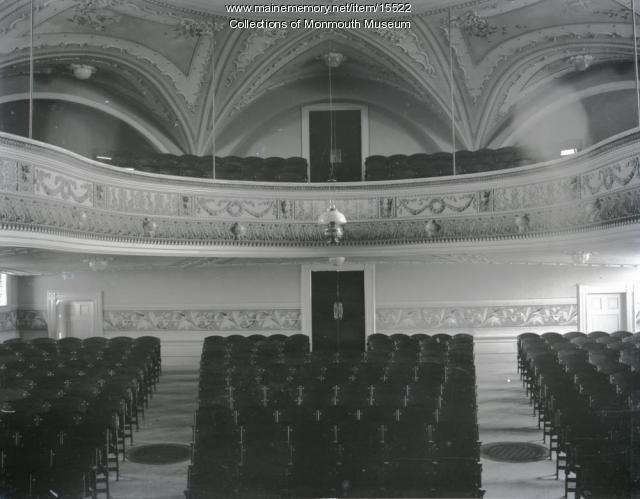Keywords: Operas
- Historical Items (226)
- Tax Records (0)
- Architecture & Landscape (1)
- Online Exhibits (23)
- Site Pages (45)
- My Maine Stories (1)
- Lesson Plans (1)
Online Exhibits
Your results include these online exhibits. You also can view all of the site's exhibits, view a timeline of selected events in Maine History, and learn how to create your own exhibit. See featured exhibits or create your own exhibit
Exhibit
Music in Maine - Opera, Orchestras and Stages
"Opera houses hosted lectures, plays, live music, and movies, with many hosting actual operas, such as The Merry Widow in Lewiston and Faust in…"
Exhibit
Lillian Nordica: Farmington Diva
Lillian Norton, known as Nordica, was one of the best known sopranos in America and the world at the end of the nineteenth and beginning of the twentieth centuries. She was a native of Farmington.
Exhibit
Bookplates Honor Annie Louise Cary
A summer resident of Wayne collected more than 3,000 bookplates to honor Maine native and noted opera singer Annie Louise Cary and to support the Cary Memorial Library.
Exhibit
Lewiston, Maine's second largest city, was long looked upon by many as a mill town with grimy smoke stacks, crowded tenements, low-paying jobs, sleazy clubs and little by way of refinement, except for Bates College. Yet, a noted Québec historian, Robert Rumilly, described it as "the French Athens of New England."
Exhibit
"Use the navigation tools on the left to explore the exhibition Caribou Amateur Opera Company, 1898Caribou Public Library"
Exhibit
Music in Maine - Music in Maine
"… work chants and sailor shanties differ from operas sung by 19th century Maine divas. Yet they are all uniquely Maine sounds."
Exhibit
"… showcasing their talents and performing in operas, vaudeville, and so-called “Wild West” shows."
Exhibit
Music in Maine - Community and School Marching Bands
"He sang the tenor lead in several Lewiston operas and was an early recording artist for Victor Records."
Exhibit
Music in Maine - Country Music
"… for over thirty years appearing in town halls and opera houses performing music, dance, and comedy in their act."
Exhibit
"… of Yiddish, Israeli, Chassidic, Broadway, opera and pop music as of 2024. Alan B. Jacobs ran Tikva Records, a label specializing in Jewish American…"
Exhibit
In 1954, November 11 became known as Veterans Day, a time to honor American veterans of all wars. The holiday originated, however, as a way to memorialize the end of World War I, November 11, 1918, and to "perpetuate peace through good will and mutual understanding between nations." Mainers were involved in World War I as soldiers, nurses, and workers on the homefront aiding the military effort.
Exhibit
Graduations -- and schools -- in the 19th through the first decade of the 20th century often were small affairs and sometimes featured student presentations that demonstrated what they had learned. They were not necessarily held in May or June, what later became the standard "end of the school year."
Exhibit
Washington County Through Eastern's Eye
Images taken by itinerant photographers for Eastern Illustrating and Publishing Company, a real photo postcard company, provide a unique look at industry, commerce, recreation, tourism, and the communities of Washington County in the early decades of the twentieth century.
Exhibit
Selections from the Collections
Maine Historical Society staff come across unique and unforgettable items in our collections every day. While it's difficult to choose favorites from a dynamic collection, this exhibit features memorable highlights as selected by members of the MHS staff.
Exhibit
Hermann Kotzschmar: Portland's Musical Genius
During the second half of the 19th century, "Hermann Kotzschmar" was a familiar household name in Portland. He spent 59 years in his adopted city as a teacher, choral conductor, concert artist, and church organist.
Exhibit
Promoting Rockland Through a Stereopticon, 1875
Frank Crockett and photographer J.P. Armbrust took stereo views of Rockland's downtown, industry, and notable homes in the 1870s as a way to promote tourism to the town.
Exhibit
Dressing Up, Standing Out, Fitting In
Adorning oneself to look one's "best" has varied over time, gender, economic class, and by event. Adornments suggest one's sense of identity and one's intent to stand out or fit in.
Exhibit
We Used to be "Normal": A History of F.S.N.S.
Farmington's Normal School -- a teacher-training facility -- opened in 1863 and, over the decades, offered academic programs that included such unique features as domestic and child-care training, and extra-curricular activities from athletics to music and theater.
Exhibit
"We are growing to be somewhat cosmopolitan..." Waterville, 1911
Between 1870 and 1911, Waterville more than doubled in size, becoming a center of manufacturing, transportation, and the retail trade and offering a variety of entertainments for its residents.
Exhibit
A fire and two men whose lives were entwined for more than 50 years resulted in what is now considered to be "the Jewel of Portland" -- the Austin organ that was given to the city of Portland in 1912.
Exhibit
Longfellow: The Man Who Invented America
Henry Wadsworth Longfellow was a man and a poet of New England conscience. He was influenced by his ancestry and his Portland boyhood home and experience.
Exhibit
Holding up the Sky: Wabanaki people, culture, history, and art
Learn about Native diplomacy and obligation by exploring 13,000 years of Wabanaki residence in Maine through 17th century treaties, historic items, and contemporary artworks—from ash baskets to high fashion. Wabanaki voices contextualize present-day relevance and repercussions of 400 years of shared histories between Wabanakis and settlers to their region.
Exhibit
Begin Again: reckoning with intolerance in Maine
BEGIN AGAIN explores Maine's historic role, going back 528 years, in crisis that brought about the pandemic, social and economic inequities, and the Black Lives Matter movement in 2020.























